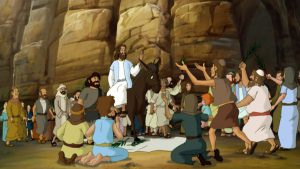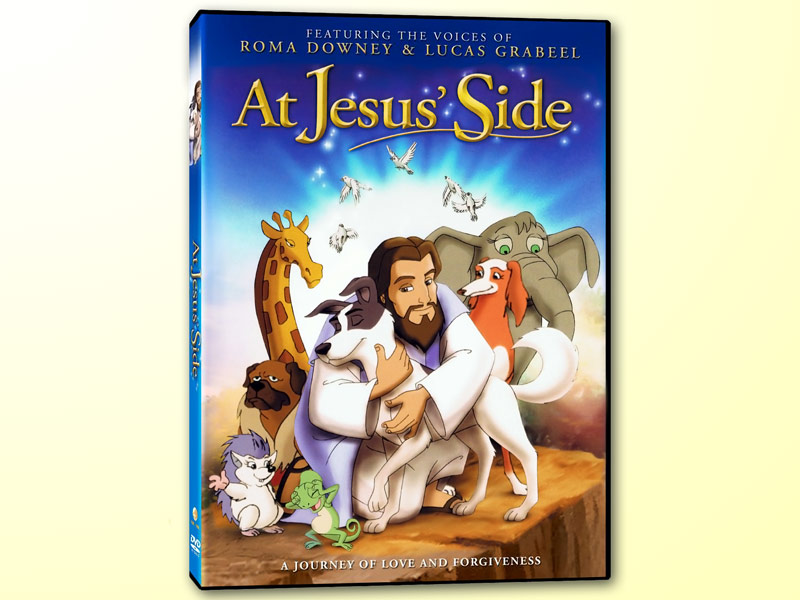 As a pastor with an MFA in Creative Writing, I am always looking for creative work which celebrates and explores the significance of Jesus and the cross through art and story. Sadly, it seems the story of Jesus’ last days pose a problem for many of our writers.
As a pastor with an MFA in Creative Writing, I am always looking for creative work which celebrates and explores the significance of Jesus and the cross through art and story. Sadly, it seems the story of Jesus’ last days pose a problem for many of our writers.
Too easily our presentations of Jesus’ life and love become overwhelmed with theological ‘weight’, and we fail to deliver what an audience wants – an experience with the man himself.
The film “At Jesus’ Side” avoids this trouble by featuring a character – Jericho, a stray dog – with  whom we immediately identify as we learn of his struggles with prejudice, hatred, and emotional anger towards humans. He has been mistreated by humans – made to feel worthless when around them. And so Jericho has found a group of friends which he loves and protects, and he finds meaning in those relationships.
whom we immediately identify as we learn of his struggles with prejudice, hatred, and emotional anger towards humans. He has been mistreated by humans – made to feel worthless when around them. And so Jericho has found a group of friends which he loves and protects, and he finds meaning in those relationships.
 Yet he still longs to know his own history.
Yet he still longs to know his own history.
He wants to make sense of his story, asking repeatedly throughout the film questions all of our children will ask:
Who am I? Do I matter? Can my past hurts and mistakes be overcome by any love – or anyone?
 Because the narrative stays with Jericho and his tribe for a while, we grow familiar with them as characters. As characters, they are a total blast – funny, sweet, and very familiar. Unlike some Christian films, the story doesn’t rush into “the churchy stuff.” This is a story that would appeal to viewers unfamiliar with the church or the Christian story. Because the story remains with our gang, we learn about each member of Jericho’s tribe: their faults, fears and hopes.
Because the narrative stays with Jericho and his tribe for a while, we grow familiar with them as characters. As characters, they are a total blast – funny, sweet, and very familiar. Unlike some Christian films, the story doesn’t rush into “the churchy stuff.” This is a story that would appeal to viewers unfamiliar with the church or the Christian story. Because the story remains with our gang, we learn about each member of Jericho’s tribe: their faults, fears and hopes.
 When finally Jesus’ path crosses Jericho’s, we have a sense that he is in great need. Because we care about Jericho, the question rises: Can Jesus meet his need? And we really want him to! It is refreshing to see the stark contrast Jesus presents in the life of a dog who has never been loved before by a human – let alone the son of God.
When finally Jesus’ path crosses Jericho’s, we have a sense that he is in great need. Because we care about Jericho, the question rises: Can Jesus meet his need? And we really want him to! It is refreshing to see the stark contrast Jesus presents in the life of a dog who has never been loved before by a human – let alone the son of God.
 In the film, Jesus is presented as a real man who interacts with people because he is full of authentic love for them. He seems to really care for people – and all God’s creatures – seeing each person just as they are. He kneels down when he speaks with them. He is not afraid to touch them. His love is revealed most powerfully during his moments with Jericho, including a tastefully directed moment at the cross – a moment which focuses on Jericho’s realization that Jesus, too, has been terribly mistreated at the hands of humans…to the point of death.
In the film, Jesus is presented as a real man who interacts with people because he is full of authentic love for them. He seems to really care for people – and all God’s creatures – seeing each person just as they are. He kneels down when he speaks with them. He is not afraid to touch them. His love is revealed most powerfully during his moments with Jericho, including a tastefully directed moment at the cross – a moment which focuses on Jericho’s realization that Jesus, too, has been terribly mistreated at the hands of humans…to the point of death.
 It is this moment when Jericho realizes the power of God’s forgiveness. After this experience – I don’t want to give too much away – we see the results of what any pastor would describe as God’s grace in Jericho’s life as he takes on the nature of Jesus in his relationships, even with Psychosis, the arch villain.
It is this moment when Jericho realizes the power of God’s forgiveness. After this experience – I don’t want to give too much away – we see the results of what any pastor would describe as God’s grace in Jericho’s life as he takes on the nature of Jesus in his relationships, even with Psychosis, the arch villain.
Pastor John Huddle of The Westchester Church of the Nazarene in Los Angeles. (© 2008)




